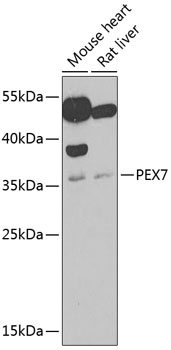Anti-PEX7 Antibody (CAB6944)
- SKU:
- CAB6944
- Product type:
- Antibody
- Reactivity:
- Human
- Reactivity:
- Mouse
- Reactivity:
- Rat
- Host Species:
- Rabbit
- Isotype:
- IgG
- Antibody Type:
- Polyclonal Antibody
- Research Area:
- Cell Biology
Frequently bought together:
Description
| 抗体名: | Anti-PEX7 Antibody |
| 抗体コード: | CAB6944 |
| 抗体サイズ: | 20uL, 50uL, 100uL |
| 申し込み: | WB |
| 反応性: | Human, Mouse, Rat |
| 宿主種: | Rabbit |
| 免疫原: | Recombinant fusion protein containing a sequence corresponding to amino acids 1-240 of human PEX7 (NP_000279.1). |
| 申し込み: | WB |
| 推奨希釈: | WB 1:500 - 1:2000 |
| 反応性: | Human, Mouse, Rat |
| ポジティブサンプル: | Mouse heart, Rat liver |
| 免疫原: | Recombinant fusion protein containing a sequence corresponding to amino acids 1-240 of human PEX7 (NP_000279.1). |
| 精製方法: | Affinity purification |
| ストレージバッファ: | Store at -20'C. Avoid freeze / thaw cycles. Buffer: PBS with 0.02% sodium azide, 50% glycerol, pH7.3. |
| アイソタイプ: | IgG |
| 順序: | MSAV CGGA ARML RTPG RHGY AAEF SPYL PGRL ACAT AQHY GIAG CGTL LILD PDEA GLRL FRSF DWND GLFD VTWS ENNE HVLI TCSG DGSL QLWD TAKA AGPL QVYK EHAQ EVYS VDWS QTRG EQLV VSGS WDQT VKLW DPTV GKSL CTFR GHES IIYS TIWS PHIP GCFA SASG DQTL RIWD VKAA GVRI VIPA HQAE ILSC DWCK YNEN LLVT GAVD CSLR GWDL RNVR QPVF ELLG |
| 遺伝子ID: | 5191 |
| Uniprot: | O00628 |
| セルラーロケーション: | Cytoplasm, Peroxisome |
| 計算された分子量: | 30kDa/35kDa |
| 観察された分子量: | 36kDa |
| 同義語: | PEX7, PBD9B, PTS2R, RCDP1, RD |
| バックグラウンド: | This gene encodes the cytosolic receptor for the set of peroxisomal matrix enzymes targeted to the organelle by the peroxisome targeting signal 2 (PTS2). Defects in this gene cause peroxisome biogenesis disorders (PBDs), which are characterized by multiple defects in peroxisome function. There are at least 14 complementation groups for PBDs, with more than one phenotype being observed in cases falling into particular complementation groups. Although the clinical features of PBD patients vary, cells from all PBD patients exhibit a defect in the import of one or more classes of peroxisomal matrix proteins into the organelle. Defects in this gene have been associated with PBD complementation group 11 (PBD-CG11) disorders, rhizomelic chondrodysplasia punctata type 1 (RCDP1), and Refsum disease (RD). |
| UniProt Protein Function: | PEX7: Binds to the N-terminal PTS2-type peroxisomal targeting signal and plays an essential role in peroxisomal protein import. Defects in PEX7 are the cause of peroxisome biogenesis disorder complementation group 11 (PBD-CG11). PBD refers to a group of peroxisomal disorders arising from a failure of protein import into the peroxisomal membrane or matrix. The PBD group is comprised of four disorders: Zellweger syndrome (ZWS), neonatal adrenoleukodystrophy (NALD), infantile Refsum disease (IRD), and classical rhizomelic chondrodysplasia punctata (RCDP). ZWS, NALD and IRD are distinct from RCDP and constitute a clinical continuum of overlapping phenotypes known as the Zellweger spectrum. The PBD group is genetically heterogeneous with at least 13 distinct genetic groups as concluded from complementation studies. Defects in PEX7 are the cause of rhizomelic chondrodysplasia punctata type 1 (RCDP1). RCDP1 is characterized by rhizomelic shortening of femur and humerus, vertebral disorders, cataract, cutaneous lesions and severe mental retardation. Defects in PEX7 are a cause of Refsum disease (RD); also known as phytanic acid oxidase deficiency. RD is clinically characterized by a tetrad of abnormalities: retinitis pigmentosa, peripheral neuropathy, cerebellar ataxia, and elevated protein levels in the cerebrospinal fluid (CSF). Patients exhibit accumulation of the branched-chain fatty acid, phytanic acid, in blood and tissues. Less constant features are nerve deafness, anosmia, skeletal abnormalities, ichthyosis, cataracts and cardiac impairment. Manifestations of the disease appear in the second or third decade of life. Belongs to the WD repeat peroxin-7 family. |
| UniProt Protein Details: | Chromosomal Location of Human Ortholog: 6q23.3 Cellular Component: peroxisomal matrix; peroxisome; cytosol Molecular Function:enzyme binding; protein homodimerization activity; peroxisome matrix targeting signal-2 binding Biological Process: fatty acid beta-oxidation; peroxisome organization and biogenesis; protein import into peroxisome matrix; neuron migration; ether lipid biosynthetic process; endochondral ossification Disease: Peroxisome Biogenesis Disorder 9b; Refsum Disease, Classic; Rhizomelic Chondrodysplasia Punctata, Type 1 |
| NCBI Summary: | This gene encodes the cytosolic receptor for the set of peroxisomal matrix enzymes targeted to the organelle by the peroxisome targeting signal 2 (PTS2). Defects in this gene cause peroxisome biogenesis disorders (PBDs), which are characterized by multiple defects in peroxisome function. There are at least 14 complementation groups for PBDs, with more than one phenotype being observed in cases falling into particular complementation groups. Although the clinical features of PBD patients vary, cells from all PBD patients exhibit a defect in the import of one or more classes of peroxisomal matrix proteins into the organelle. Defects in this gene have been associated with PBD complementation group 11 (PBD-CG11) disorders, rhizomelic chondrodysplasia punctata type 1 (RCDP1), and Refsum disease (RD). [provided by RefSeq, Oct 2008] |
| UniProt Code: | O00628 |
| NCBI GenInfo Identifier: | 3122596 |
| NCBI Gene ID: | 5191 |
| NCBI Accession: | O00628.1 |
| UniProt Secondary Accession: | O00628,C0H5X6, |
| UniProt Related Accession: | O00628 |
| Molecular Weight: | 323 |
| NCBI Full Name: | Peroxisomal targeting signal 2 receptor |
| NCBI Synonym Full Names: | peroxisomal biogenesis factor 7 |
| NCBI Official Symbol: | PEX7 |
| NCBI Official Synonym Symbols: | RD; PBD9B; PTS2R; RCDP1 |
| NCBI Protein Information: | peroxisomal biogenesis factor 7; peroxin-7; PTS2 receptor; peroxisomal PTS2 receptor; peroxisome targeting signal 2 receptor; peroxisomal targeting signal 2 receptor |
| UniProt Protein Name: | Peroxisomal targeting signal 2 receptor |
| UniProt Synonym Protein Names: | Peroxin-7 |
| Protein Family: | Peroxisome biogenesis protein |
| UniProt Gene Name: | PEX7 |
| UniProt Entry Name: | PEX7_HUMAN |
View AllClose


